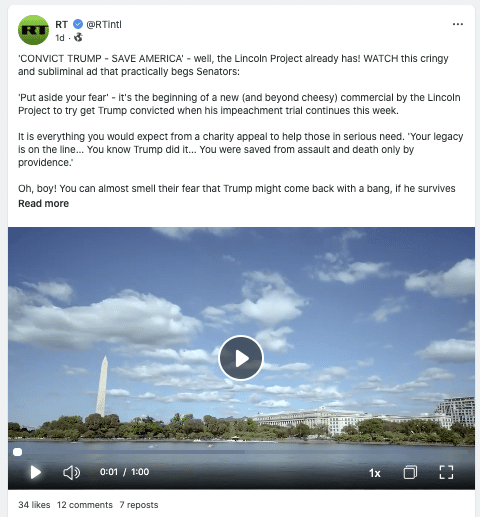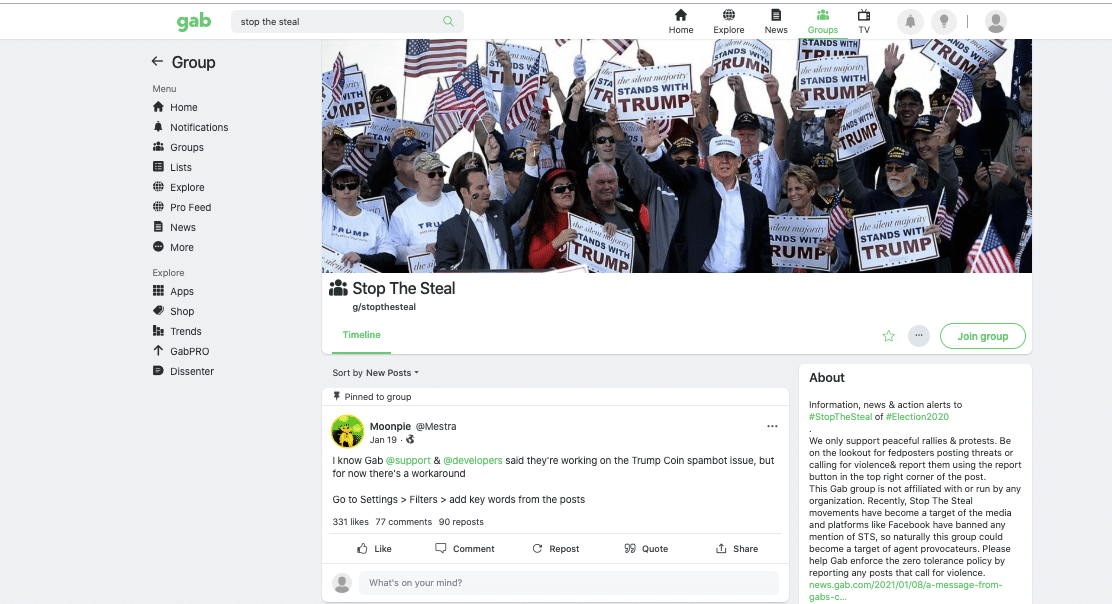As Trump’s impeachment trial begins, the Russian network that helped him in 2016 taps his supporters on Gab.com
By Matt Field | February 9, 2021
 Russian President Vladimir Putin visited the RT network in 2015. Credit: www.kremlin.ru via Wikimedia Commons. CC BY 4.0.
Russian President Vladimir Putin visited the RT network in 2015. Credit: www.kremlin.ru via Wikimedia Commons. CC BY 4.0.
On the eve of former President Donald Trump’s second impeachment trial in the Senate, a Russian government-affiliated media outlet that worked to help Trump win in 2016 opened an account on Gab, a social media network popular with people who believe the false conspiracy theory that Trump won again in 2020. The Russian network RT started posting on Gab just as the US Senate was to begin weighing Trump’s impeachment on the charge that he incited the deadly riots at the US Capitol last month by urging his supporters to fight back against a “stolen election.”
In one of its first posts, RT trashed an ad by the Lincoln Project, an organization started by anti-Trump Republicans, writing, “‘CONVICT TRUMP – SAVE AMERICA’—well, the Lincoln Project already has!” The Russian network called the Lincoln Project ad “beyond cheesy,” adding, “Oh, boy! You can almost smell their fear that Trump might come back with a bang.” In another post, RT reports on a right-wing radio host who was recently suspended from Twitter for violating the platform’s civic integrity rules, which are meant to prevent elections manipulation. “While Social media clamps down on so-called ‘Domestic terrorists’—it is still allowing the likes of [Iranian supreme leader] Ayatollah Khamenei to have a global voice,” the post reads.
One post criticizes an FBI disinformation expert as a “fantasy fiction writer.” Still another quotes a right-winger banned from Twitter, The Gateway Pundit CEO Jim Hoft, as saying, “you cannot challenge anything about the 2020 election, and yet there are still individuals who are challenging the 2016 election.”

Gab claims to be a platform for free speech and it has long sought to appeal to conservatives and even extremists like white supremacist Richard Spencer who either dislike mainstream sites like Twitter or have been booted off them for promoting hate speech or disinformation. The site maintains a placeholder account for Trump in the hopes that he will join Gab after being booted from other social networks. The account’s description says it posts email messages from Trump’s office and has an archive of his tweets. Twitter banned Trump after the Jan. 6 riot at the Capitol in which a horde of Trump-supporting white supremacists and other militants overwhelmed Capitol security, beat police officers, and terrorized lawmakers who were forced into hiding spaces.
One group on Gab, “Stop the Steal,” has 162,000 members, according to the site. The group’s name references a call to action popular among people who believe Trump actually won the 2020 election. Facebook, on the other hand, has been removing posts that reference that false conspiracy theory. Another Gab group called “QAnon,” is devoted to the conspiracy theory that a deep state of Democratic pedophiles has been working against Trump. It has 153,500 members, according to the Gab’s metrics. Facebook and Twitter have both worked to remove QAnon content in recent months.
In 2017, after Russian government-backed operatives orchestrated a multi-pronged attack on the 2016 US presidential election that involved hacking Democrat Hillary Clinton’s campaign as well as a vast social-media disinformation operation, the US national intelligence director’s office released a report describing RT as playing a pivotal role in Moscow’s effort to help Trump. The report accused RT of “conducting strategic messaging” for the Russian government and “undermining viewers’ trust in US democratic procedures.” The network’s content was widely viewed on social media, where its YouTube videos, for example, were viewed a million times a day, according to the report.
“The rapid expansion of RT’s operations and budget and recent candid statements by RT’s leadership point to the channel’s importance to the Kremlin as a messaging tool and indicate a Kremlin-directed campaign to undermine faith in the US government and fuel political protest,” the report reads.

Since 2016, RT has continued to depict US society as though it were teetering on the edge of collapse, torn apart by forces such as racism and political oppression. A recent analysis by Princeton University’s Empirical Studies of Conflict program found that RT worked harder than other foreign networks to expose the seams in US society, publishing on last summer’s protests in Portland, Ore., at a much higher rate than the network Al Jazeera, for instance.
Many stories on RT are thin. The Princeton study found that with a reporting staff perhaps just a quarter of the size of Al Jazeera’s, RT put out twice as many English-language stories between June and October. “RT does not seem to be putting much time into its reporting,” the researchers wrote in the Bulletin.
On Gab, RT will find a reportedly swelling audience for its content, including plenty of people ready to believe the worst about mainstream institutions. In mid-January, Gab claimed to have gotten 2.3 million new users in a matter of weeks. After the Anti-Defamation League, a nonprofit focused on countering extremism and anti-Semitism, accused Gab of hosting some of the plotters behind the Capitol riots and called for an investigation, Gab posted a response saying the network had been working with law enforcement and removing violent threats from the site in the lead up to Jan. 6. Gab CEO Andrew Torba’s Jan. 13 statement said the Anti-Defamation League should instead investigate Facebook, “where the protests were actually organized.” Ahead of the riots, Facebook and Twitter did provide a critical platform to Trump and his disgruntled base to discredit the elections, but have clamped down since then on the kind of conspiratorial content still flowing on Gab.
Like Parler, a rival conservative social media site which was forced offline before reappearing as a static webpage after the Capitol riots, web services providers have tried to push Gab offline—so far unsuccessfully. The site has continued to grow, a fact RT seems to have taken note of.
Together, we make the world safer.
The Bulletin elevates expert voices above the noise. But as an independent nonprofit organization, our operations depend on the support of readers like you. Help us continue to deliver quality journalism that holds leaders accountable. Your support of our work at any level is important. In return, we promise our coverage will be understandable, influential, vigilant, solution-oriented, and fair-minded. Together we can make a difference.
Keywords: 2020 presidential election, Disinformation, Gab, RT, impeachment, riots
Topics: Disruptive Technologies
















This is called blowback. After the end of the cold war the U.S. under President Clinton did large-scale interventions in the Russian elections that ultimately brought Putin to power. Putin did not forget the Clintons in the election between Trump and Clinton. Like Iran, our intervention turned out badly. One suspects the outcome would have been different if we had not interfered with Russian internal affairs. In the last 30 years we have had one major intervention after another in multiple countries–and most have turned out badly for the U.S. The real question is have we learned anything? Perhaps we… Read more »
Sure, let Russians unrestrainedly undermine all the world around, but you’ll be peacefully waiting for positive results for the United States. Endlessly long. Vladimir Lenin at his time very precisely called such kind people on the West as USEFUL IDIOTS.